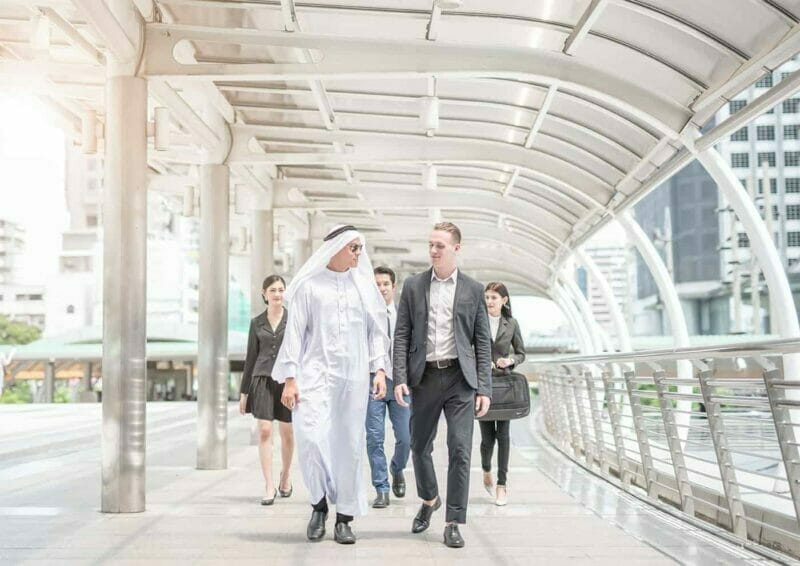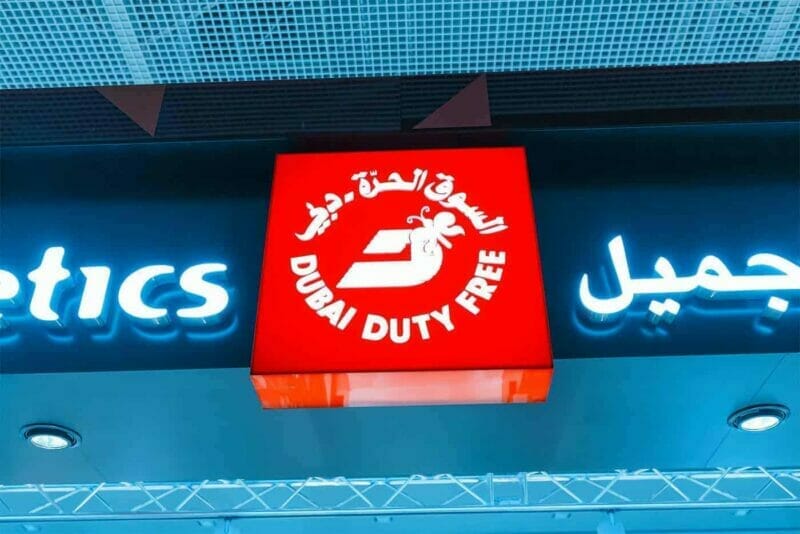Dubai’s tax-free living has always been a magnet for skilled expats from all over the world.
Indeed, the idea of working in Dubai and having an opportunity to grow your personal wealth without tax reductions is extremely appealing.
It’s true that the UAE Dubai income tax rate is zero and is one of the pros of living in Dubai.
Like the rest of the UAE, Dubai earns its revenue mainly through the oil industry and uses its no-tax policy to attract skilled expats and global companies to diversify and enrich its economy further.

However, that sounds far too good to be true, doesn’t it?
This is why in this article, we’re going to lay out the truth about tax in Dubai and the UAE taxation system to see what you pay and what you don’t pay when it comes to taxes in Dubai.
UAE tax system – general overview
Are the UAE taxes different from Dubai taxes?
Well, there is no unified federal tax legislation in the UAE.
That is why although most UAE tax rules and international agreements work in all the Emirates, there are cases when each emirate can set its own tax rules.

As an example, most DTTs cover the whole UAE, but the actual taxes in each emirate can be decided on a local level.
The Emirates doesn’t levy any personal tax or capital tax.
It’s true for both UAE citizens and expats.
As a result, there is no special taxation regime for expat workers in the UAE, as they are treated the same way as citizens when it comes to personal or capital income tax.
Rental taxes
Most Emirates impose a rental tax, and the rules may vary in different Emirates.
Renting a property in Dubai, for example, adds 5% of annual rent to the bill for residential tenants.
In Abu Dhabi, expat tenants pay 3% of annual rent, whereas UAE citizens do not pay any rental tax. All tenants pay 2% of the annual rent as rental tax in Sharjah.
Municipalities also impose a tax on services which impacts your bills in restaurants and hotels. Again, it varies from Emirate to Emirate.
UAE tourist tax
Tourists might find that they’ve been charged up to 10% tax on the room rate, 10% on service charge, and 10% on municipality fees.
Some tourist facilities may also charge a city tax (ranging from 6 to 10%) and a 6% tourism fee.
Other taxes in the UAE
You will also be charged a property tax if you transfer property in the UAE: 4% in the Emirate of Dubai and 2% in the Emirate of Abu Dhabi.
There are no withholding taxes in the UAE levied on a federal level.
As of 2018, the UAE has signed 115 double-taxation treaties, most of them aimed at preventing double taxation of income, capital gains, reducing tax on dividends, and tax-exempt deposits.
Taxes in Dubai
All the federal level tax laws cover Dubai as well: there is no income tax in Dubai, VAT is levied at a national level, and Dubai inherits and benefits from all the DTTs signed by the UAE.
Locally, however, some of Dubai’s taxes can differ from the rest of the UAE.
Dubai income tax
The zero-income tax policy in Dubai won’t be changed in the foreseeable future.
Sheikh Mohammed bin Rashid Al Maktoum, the Vice-President and Prime Minister of the UAE and the Ruler of Dubai, stated that his country would never adopt an income tax as a way to tackle the deficit.
My country would never adopt an income tax as a way to tackle the deficit. My reply is: No income taxes.
Sheikh Mohammed bin Rashid Al Maktoum
This means that it is unlikely that tax will ever be levied on an individual’s income in Dubai.
Dubai residents also enjoy tax-free rental income, no stamp duty, and no tax on capital gains or inheritance.
However, just because you reside in Dubai, it doesn’t mean that you can enjoy a tax-free income.
The main question is your tax residency.
Are you a tax resident in Dubai?
This is a very important question that actually defines whether you pay taxes when working in Dubai or not.
If you earn your income in Dubai but are a tax resident elsewhere, you may be subject to taxation on your income.
This is because most expats pay taxes according to their residency.
What is your tax residency?
If you take a 6-month contract in Dubai and live and work in the emirate for just six months, you are likely to remain an ordinary resident in your home country for tax purposes, and your income could be subject to your home country’s taxation.
If you live elsewhere and have an investment property in Dubai from which you earn a rental income, you will have to declare this income on your tax return in the country of your tax residence and potentially pay tax on it if your overall earnings are above the nil rate band for income tax.
If you move to Dubai for a long term, or you are out of your home country for a long enough period to qualify as a non-resident for tax purposes, then you may be able to earn your salary in Dubai 100% free of income taxation.
A tax year trick
Many countries qualify their citizens for tax purposes based on a tax year.
From this point of view, the question of when you leave your country of domicile for Dubai is crucial.
If you spend the most part of the current tax year in your country of domicile, you might be considered a tax resident for that tax year by the tax authorities and taxed on your income for the whole year regardless of the fact that part of the income for that year was earned in Dubai.
If you are a UK citizen and the UK domiciled, even a year-long contract in Dubai may not be enough to exempt you from your income tax obligations in the UK, as it might cover just half of the current tax year and half of the next tax year.
The good news is that as long as your stay in Dubai covers the qualifying part of a tax year in your country of domicile, you most likely will be able to enjoy your Dubai income tax-free.
Every person’s position is unique, and you have to be fully clear about your tax status and obligation for taxation at home or abroad. If you are unsure, seek qualified professional advice.
Indirect taxes and tax rates in Dubai
In terms of any other taxes in Dubai – they do exist contrary to popular belief.
For a start, the profits of international banks and energy firms are taxed at the federal level – which is probably no bad thing!
Alcohol is heavily taxed upon importation. It’s 50% to bring it into the country and then another 30% if you have a liquor license and buy alcohol for home consumption.
Dubai tourist tax
What’s more, you’re taxed on any visit to a hotel in Dubai for a stay or even a meal out.
The tax adds 10% to your bill and is called the Dubai tourist tax.
This tourist tax in Dubai is included in the bill and imposed on every guest staying at a hotel, guestroom, or hotel apartment.
As a result, it can cost you 7 to 20 dirhams per night, depending on the type of hotel and its rating. A relatively cheap guest house will charge 7 AED, while 5-star hotels will add 20 AED per night.
Council tax and rental tax
There is also a form of council tax secretly levied when you pay your utility bills – and many people protest against this tax as it is supposedly for street lighting, waste collection, etc., and yet most residents pay for this through maintenance fees.
So, you are effectively charged council tax in Dubai twice – oh, and there is a 10% municipality tax as well as a 5% municipality tax on rented accommodations collected through utility bills.
Dubai departure tax
A departure tax in Dubai is charged when you’re buying an airplane ticket for a plane that either lands or takes off at one of the Dubai airports.
The Dubai departure tax is included in the price of the ticket, no matter where you purchase it.
Children below the age of two, transit passengers, and members of the cabin crew are exempt from paying this kind of Dubai tourist tax.
Other taxes in Dubai
You will have to pay a 4 AED toll tax on crossing every toll booth in Dubai.
There is also a 10 AED knowledge tax + 10 AED innovation tax on using government services.
If you are using a centralized cooling system (district cooling), you might find that your bills are much higher than those for traditional individual air conditioning units.
Although formally, it’s not a tax, however, it’s a bill for you to pay to the district cooling companies for their investments into innovative technologies.
With the introduction of mandatory health insurance in Dubai, there might be additional charges depending on your work contract.
In some cases, it might result in your potential tax savings being reduced by the extra costs of healthcare.
Value-added tax in Dubai
VAT was introduced in the UAE in January 2018 on a federal level.
VAT is charged at a rate of 5%. The exception is food items, health, education, petroleum products, social services, and bicycles.
The financial services and residential property sectors are also exempt from VAT (with certain exceptions).
Other consumption taxes
Excise duties were introduced in 2017 for three types of products: carbonated beverages (50%), tobacco (100%), and energy drinks (100%)
Dubai income tax in summary
You can potentially earn your salary 100% free of tax in Dubai if you are a tax resident in the emirate and have no other obligation to any other state for the payment of tax on foreign-earned and sourced income.
However, there are taxes that you will encounter if you live in Dubai, and if you want to make sure you fully understand your personal tax obligations, it is recommended you speak to an accountant.
You might find useful:
- Living In Dubai – a detailed expat guide to settling down in Dubai;
- Working In Dubai – how to find a job in the UAE;
- Dubai Rules & Laws Explained
- Dubai’s Best Neighborhoods For Families
Helpful external links:
- Taxation – the official portal of the UAE Government.
- Corporate tax (CT) – the official portal of the UAE Government.
- Tax residency certificate – online application.
2 comments
Sonia Raimondi
Excellent article, well done. I can fully vouch for the information presented. For instance, we have been observing the exact trend of inquiries and emerging businesses relocating to Dubai. More and more, Dubai is becoming the global hub for commerce and production. Once again, kudos on the article.
Allan
An immigration organization is requesting me to show history of my tax payments in UAE 🇦🇪.
How do I go about to get this document considering Dubai is a tax free Emirates for foreign employees.